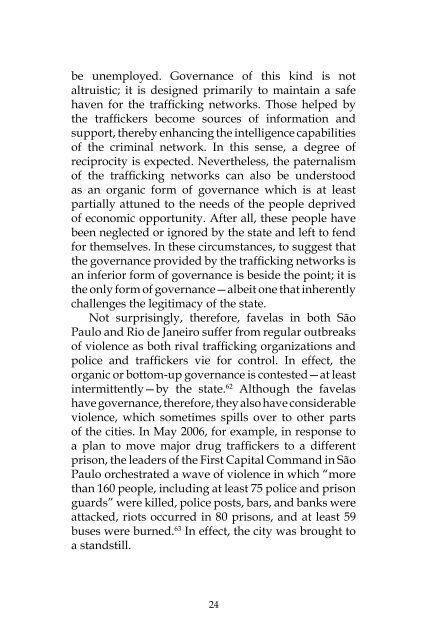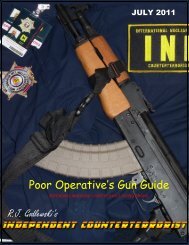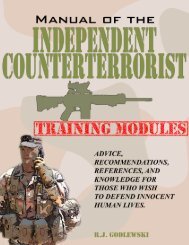R.J. Godlewski's The Independent Counterterrorist. I, Militia. June ...
R.J. Godlewski's The Independent Counterterrorist. I, Militia. June ...
R.J. Godlewski's The Independent Counterterrorist. I, Militia. June ...
- No tags were found...
You also want an ePaper? Increase the reach of your titles
YUMPU automatically turns print PDFs into web optimized ePapers that Google loves.
e unemployed. Governance of this kind is not<br />
altruistic; it is designed primarily to maintain a safe<br />
haven for the trafficking networks. Those helped by<br />
the traffickers become sources of information and<br />
support, thereby enhancing the intelligence capabilities<br />
of the criminal network. In this sense, a degree of<br />
reciprocity is expected. Nevertheless, the paternalism<br />
of the trafficking networks can also be understood<br />
as an organic form of governance which is at least<br />
partially attuned to the needs of the people deprived<br />
of economic opportunity. After all, these people have<br />
been neglected or ignored by the state and left to fend<br />
for themselves. In these circumstances, to suggest that<br />
the governance provided by the trafficking networks is<br />
an inferior form of governance is beside the point; it is<br />
the only form of governance—albeit one that inherently<br />
challenges the legitimacy of the state.<br />
Not surprisingly, therefore, favelas in both São<br />
Paulo and Rio de Janeiro suffer from regular outbreaks<br />
of violence as both rival trafficking organizations and<br />
police and traffickers vie for control. In effect, the<br />
organic or bottom-up governance is contested—at least<br />
intermittently—by the state. 62 Although the favelas<br />
have governance, therefore, they also have considerable<br />
violence, which sometimes spills over to other parts<br />
of the cities. In May 2006, for example, in response to<br />
a plan to move major drug traffickers to a different<br />
prison, the leaders of the First Capital Command in São<br />
Paulo orchestrated a wave of violence in which “more<br />
than 160 people, including at least 75 police and prison<br />
guards” were killed, police posts, bars, and banks were<br />
attacked, riots occurred in 80 prisons, and at least 59<br />
buses were burned. 63 In effect, the city was brought to<br />
a standstill.<br />
24







